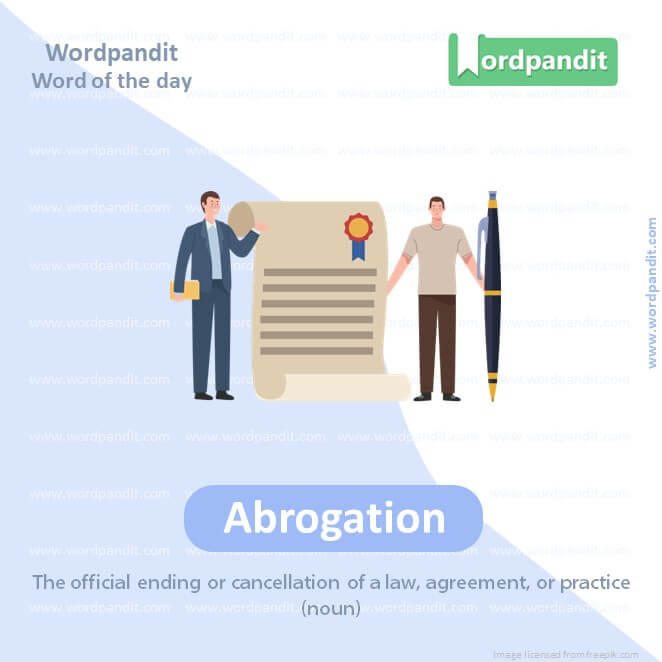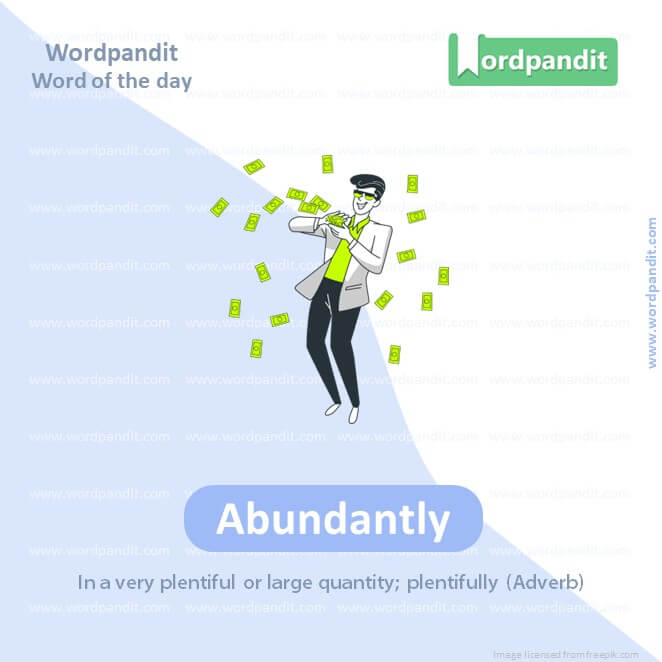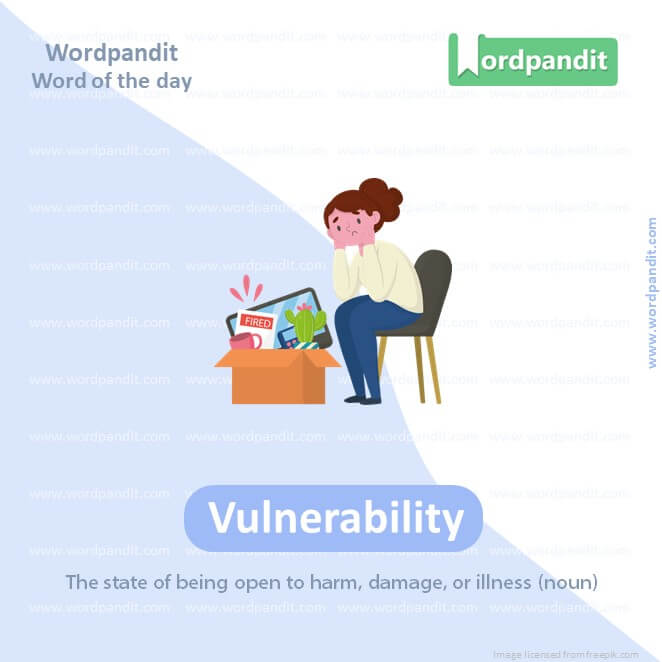Daily Vocabulary Words: List of Daily Used Words in Leading Indian Newspapers
Hi there. Welcome to this special section @ Wordpandit. Our endeavour here is straightforward: highlighting daily vocabulary words that you would come across in leading newspapers in the country. We have included the following newspapers in our selection:
• The Times of India
• The Economic Times
• Hindustan Times
• Mint
• Indian Express
We are putting in extensive work to develop your vocabulary. All you have to do is be regular with this section and check out this post daily. This is your repository of commonly used words; essentially, we are posting a list of daily used words. Hence, this has significant practical application as it teaches you words that are commonly used in leading publications mentioned above.
Visit the website daily to learn words from leading Indian newspapers.

WORD-1: Abrogation
CONTEXT: The stark difference 35 years later and five years after the abrogation of Article 370 is that most of India and much of J&K reverberates with the other virtual slogan.
SOURCE: Indian express
EXPLANATORY PARAGRAPH: Imagine if you had a rule at home that you must go to bed by 8 pm, but one day your parents decide that this rule is no longer needed, so they remove it. That act of removing or ending the rule is what “abrogation” means. It’s like saying goodbye to a rule or a law that people don’t want or need anymore.
MEANING: The official ending or cancellation of a law, agreement, or practice (noun).
PRONUNCIATION: ab-roh-GAY-shun
SYNONYMS: cancellation, repeal, annulment, revocation, abolition
USAGE EXAMPLES:
1. The abrogation of the law was celebrated by many.
2. A treaty abrogation must be handled carefully to avoid conflict.
3. The company’s abrogation of the policy allowed employees more freedom.
4. The government faced criticism after the abrogation of environmental regulations.
WORD-2: Triggering
CONTEXT: the psychological domain remains the most important. In 1989, when Pakistan launched its long-drawn plan of wresting J&K by triggering internal turmoil, aided by external support, the ground had been well prepared.
SOURCE: Indian express
EXPLANATORY PARAGRAPH: Imagine you have a toy that makes sounds when you press a button. The act of pressing the button to make the toy sound is like “triggering.” It means starting something or making something happen. If your friend tells a joke and it makes you laugh, the joke triggered your laughter.
MEANING: Causing something to start or happen, especially suddenly (verb).
PRONUNCIATION: TRIH-guh-ring
SYNONYMS: initiating, sparking, activating, provoking, setting off
USAGE EXAMPLES:
1. Watching the movie was triggering happy memories.
2. The alarm was triggering at exactly 6 AM.
3. A loud noise was triggering the dog’s barking.
4. Certain words can be triggering emotional responses.
WORD-3: Deliverance
CONTEXT: That has largely changed under Prime Minister Modi’s passionate deliverance of urban and rural development.
SOURCE: Indian express
EXPLANATORY PARAGRAPH: Imagine you’re stuck at the top of a slide and too scared to go down, but then someone helps you down safely. That feeling of being safe again is like “deliverance.” It means being rescued or set free from something scary or difficult.
MEANING: The act of being rescued or set free, especially from something harmful or unpleasant (noun).
PRONUNCIATION: duh-LIV-er-ance
SYNONYMS: liberation, rescue, salvation, release, freedom
USAGE EXAMPLES:
1. The story of their deliverance from the island was amazing.
2. They prayed for deliverance from hardship.
3. The deliverance of the hostages was a moment of joy.
4. After years of struggle, their deliverance came unexpectedly.
WORD-4: Orientation
CONTEXT: His balanced ideological orientation has been a force multiplier as has been his willingness to meet people.
SOURCE: Indian express
EXPLANATORY PARAGRAPH: Imagine your first day at a new school, and you’re shown around the school, told about the rules, and introduced to your classmates. This process of getting to know the new place and what you’re supposed to do there is called “orientation.” It’s like getting familiar with something new.
MEANING: The ability to locate oneself in one’s environment with reference to time, place, and people.
PRONUNCIATION: or-ee-en-TAY-shun
SYNONYMS: introduction, induction, familiarization, adjustment, acclimatization
USAGE EXAMPLES:
1. The new students had an orientation day to learn about the school.
2. Orientation sessions are helpful for new employees.
3. The orientation program included a tour of the building.
4. Her orientation to the new software was quick and efficient.

WORD-5: Abundantly
CONTEXT: the PM spoke of Mahashivratri and Ramzan in the same breath and mentioned the lotus which abundantly grows in Kashmir’s many lakes, with linkage to the symbol of his party, he was only symbolically articulating the place that J&K has in the psyche of India.
SOURCE: Indian express
EXPLANATORY PARAGRAPH: Imagine you have a box of crayons, and there are so many crayons that they almost spill out when you open the box. This means you have crayons “abundantly,” or a lot more than you need. It’s like having so much of something that you can share it with others and still have plenty left for yourself.
MEANING: In a very plentiful or large quantity; plentifully (Adverb).
PRONUNCIATION: uh-BUN-duhnt-lee
SYNONYMS: plentifully, copiously, amply, profusely, extensively
USAGE EXAMPLES:
1. Flowers grew abundantly in the garden.
2. She thanked him abundantly for his help.
3. The river provided water abundantly to the village.
4. Knowledge is abundantly available on the internet.
WORD-6: Intent
CONTEXT: he again made it clear that India’s intent was to turn the region into an international tourist hub and link it to J&K’s most important industry.
SOURCE: Indian express
EXPLANATORY PARAGRAPH: Imagine you’re aiming to build the tallest tower with your blocks. Your focus on making that tower as tall as possible is your “intent.” It’s like having a plan or a goal in your mind that you really want to achieve.
MEANING: The purpose or plan behind an action (noun); determined to do something (adjective).
PRONUNCIATION: in-TENT
SYNONYMS: (Noun) purpose, aim, objective, intention, goal; (Adjective) determined, resolute, focused, committed, purposeful
USAGE EXAMPLES:
1. Her intent was to finish the project by the deadline.
2. He listened with intent to understand the story.
3. They were intent on winning the game.
4. The letter clearly stated his intent to resign.
WORD-7: Crucial
CONTEXT: J&K is crucial to international and regional security. There are two aspects that will continue to cause concern in the all-important security domain.
SOURCE: Indian express
EXPLANATORY PARAGRAPH: Imagine you’re building a tower with blocks, and there’s one block that must be placed perfectly, or the whole tower will fall. That block is “crucial.” It means it’s really important and needed for things to go right. Without it, things might not work out well.
MEANING: Extremely important or necessary for something to succeed or exist (adjective).
PRONUNCIATION: KROO-shul
SYNONYMS: essential, critical, vital, pivotal, indispensable
USAGE EXAMPLES:
1. Water is crucial for survival.
2. The witness’s testimony was crucial to the case.
3. Making a plan is crucial for the project’s success.
4. A crucial decision was made at the meeting.

WORD-8: Extremism
CONTEXT: The second is that ideological extremism, like elsewhere, continues to remain embedded.
SOURCE: Indian express
EXPLANATORY PARAGRAPH: Imagine if someone believed that their favorite color was the only good color and all other colors were bad. They might refuse to use anything that isn’t their favorite color. This kind of thinking, where someone believes their ideas are the only right ones and won’t listen to anyone else, is called “extremism.” It’s like seeing things in only black and white, without any room for other colors or ideas.
MEANING: The holding of extreme political or religious views; fanaticism (noun).
PRONUNCIATION: ek-STREE-miz-um
SYNONYMS: radicalism, fanaticism, zealotry, dogmatism, militancy
USAGE EXAMPLES:
1. The book discusses the dangers of political extremism.
2. Efforts were made to combat extremism in the community.
3. Extremism can lead to conflict and division.
4. The campaign aimed to promote tolerance over extremism.

WORD-9: Embedded
CONTEXT: The second is that ideological extremism, like elsewhere, continues to remain embedded.
SOURCE: Indian express
EXPLANATORY PARAGRAPH: Imagine you’re playing in the sandbox and mix some small toys into the sand. Later, you find that these toys are stuck inside the sand, becoming a part of it. This is like being “embedded.” It means something is firmly and deeply placed inside something else, just like those toys in the sand.
MEANING: Fixed firmly and deeply in a surrounding mass (adjective).
PRONUNCIATION: em-BED-ed
SYNONYMS: implanted, inserted, entrenched, ingrained, integrated
USAGE EXAMPLES:
1. The journalist was embedded with the troops to report on the conflict.
2. Memories of the trip were deeply embedded in her mind.
3. The spy was embedded within the organization for years.
4. Fossils are often found embedded in rock.

WORD-10: Vulnerability
CONTEXT: its deemed leadership always perceives its own invincibility as well as India’s vulnerability.
SOURCE: Indian express
EXPLANATORY PARAGRAPH: Imagine you have a small toy that can easily break if it falls. This toy’s ability to break easily is its “vulnerability.” It means having a weakness or something about you that could make it easy for you to get hurt or upset. Just like how the toy can get hurt (break), people or things have vulnerabilities too.
MEANING: The state of being open to harm, damage, or illness (noun) .
PRONUNCIATION: vul-ner-uh-BIL-i-tee
SYNONYMS: susceptibility, weakness, defenselessness, fragility, sensitivity
USAGE EXAMPLES:
1. The security system’s vulnerability was quickly addressed.
2. He spoke about his vulnerabilities to help others feel less alone.
3. The city’s vulnerability to floods required urgent attention.
4. Awareness of one’s vulnerability is the first step toward improvement.
Vocabulary Pronunciation
The dance of language learning comprises two inseparable partners: vocabulary and pronunciation. The rhythm of this dance is best enjoyed when both partners are in sync. Essentially, mastering ‘vocabulary pronunciation’ is key to expressing and understanding a language effectively. However, what is the ideal approach to learn ‘vocabulary pronunciation’?
Firstly, the process of learning ‘vocabulary pronunciation’ isn’t a sprint. Rather, it’s a marathon where consistency is vital. A gradual and steady pace of learning new words and their pronunciation offers enough time to effectively practice and commit them to memory.
Secondly, to master ‘vocabulary pronunciation’, go beyond written text. Dwell in the world of audible language, such as documentaries, podcasts, music, or language-learning apps that provide pronunciation guides. These memorable auditory experiences aid in refining your ‘vocabulary pronunciation’ and offer a glimpse into the authentic sounds of the language.
Another beneficial strategy for learning ‘vocabulary pronunciation’ involves the use of phonetic transcriptions. They offer systematic approaches to understanding the sound system of a language, thereby improving pronunciation.
Most importantly, do not shy away from practicing your ‘vocabulary pronunciation’. Be it in a language exchange meeting, a conversation with a native speaker, or even a self-recording session, active verbalization massively boosts your pronunciation prowess.
Lastly, always remember to train your ears as much as you train your tongue. Listening carefully to native speakers helps you capture the subtleties of ‘vocabulary pronunciation’, contributing to better delivery when you speak.
In conclusion, mastering ‘vocabulary pronunciation’ is not an overnight journey. It’s a process of intentional practice, sustained listening, conscientious reflection and active usage. As you chart this course with diligence and patience, you will witness your ‘vocabulary pronunciation’ skills blossom, leading you to communicate with greater fluency and confidence.













